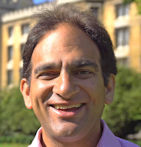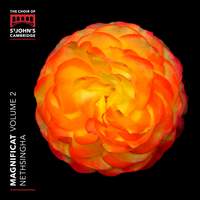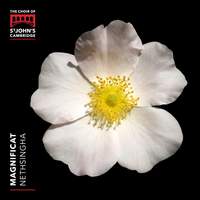Interview,
Andrew Nethsingha on Magnificat
 St John's College Cambridge have consistently impressed with their series of choral albums on the Signum label (unified by a pleasingly uniform circular design motif, while of course no less uniform in their high musical standards). The series has seen them tackle the bold contemporary works of Michael Finnissy and Jonathan Harvey, seasonal programmes focusing on Advent and Lent, and a compilation entitled 'Magnificat' showcasing the uniquely Anglican treasures of Magnificat and Nunc Dimittis settings.
St John's College Cambridge have consistently impressed with their series of choral albums on the Signum label (unified by a pleasingly uniform circular design motif, while of course no less uniform in their high musical standards). The series has seen them tackle the bold contemporary works of Michael Finnissy and Jonathan Harvey, seasonal programmes focusing on Advent and Lent, and a compilation entitled 'Magnificat' showcasing the uniquely Anglican treasures of Magnificat and Nunc Dimittis settings.
This last was barely able to scratch the surface of a vast repertoire beloved of singers and listeners alike, so it's no surprise that it's now been followed up by a second volume of such settings, no less varied than the first. Time-honoured favourites by Howells and Watson rub shoulders with more recent commissions by Walton and Berkeley, as well as a more recent Magnificat from Giles Swayne and a freshly-minted setting from Julian Anderson that suggest new directions the tradition might take in the future.
At the helm for all these recording triumphs has been Andrew Nethsingha, Director of Music at St John's since 2007; I spoke to him about the place these pieces hold in the repertoire at St John's, and what makes each setting such a unique gem.
Photo: James Beddoe.
This is your second volume of Evening Canticles, with a different emphasis to the first. There is of course an absolutely enormous wealth of settings out there; do you anticipate a third or even a fourth collection?
You’re right about the wealth of settings! I haven’t counted, but I’m guessing we have approaching 200 settings in the St John’s choir library - so there’s certainly scope for the series to continue! We were due to record a third volume last summer - let’s hope that doesn’t get postponed for too long.
Some canticle settings, perhaps particularly Howells’s Collegium Regale, have become iconic while others can feel a little more like Gebrauchsmusik (albeit finely-crafted). What do you think marks out a set of canticles out as truly great?
I think some settings are great because of their extraordinary originality and coherence - e.g. Tippett St John’s Service. Others are supreme masterpieces of their age, e.g. Gibbons Second Service. Others were innovative in their day and remain fresh, e.g. Stanford in A. Then there are the ones which speak to us deeply on an emotional and spiritual level, e.g. Howells Collegium Regale. On this particular album I love the unique approaches which different composers bring to the texts. But I also want to praise the ‘less adventurous’ pieces on our disc, such as Sumsion in G and Watson in E; truly these are jewels of liturgical writing.
This album includes two sets written for Chichester Cathedral, both commissioned by the Revd Walter Hussey, who was also the driving force behind major choral works from Finzi, Britten and Bernstein. What was it about Hussey that made him such a uniquely prolific patron?
The Walton was indeed commissioned by Hussey. The Berkeley in fact dates from just after Hussey retired, but I’m sure it wouldn’t have been written without the extraordinary tradition which Hussey created. Berkeley had recently written a setting of Psalm 23 for Hussey and Chichester. Walter Hussey was clearly a man of enormous taste and discernment. For him, only the best would do - whether in music, sculpture, painting, stained glass or other art-forms. As a young man he became very interested in contemporary art, but he gradually realised that "the arts had become largely divorced from the Church”. We need Walter Husseys in every generation! And there was his extraordinary persistence - it took him 32 years to persuade Walton to write a piece for him, but it was worth the wait! For those who want to know more, I would strongly recommend Peter Webster’s book on Hussey.
The inspiring and apparently immortal Francis Jackson, whose canticles in G are featured here, is still composing at 103. In his extraordinarily long life, how much influence do you feel he has had on the generation(s) of composers who have come after him?
He’s an incredibly inspiring figure to so many - whether his ex-choristers, organists or church composers. He’s also the most charming person you could ever hope to meet. Like Gloucester, York had a particularly strong lineage of Organist-Composers. I’m sure Francis learnt a great deal from his predecessor, Sir Edward Bairstow. Likewise his successor, Philip Moore, will have been very aware of the huge shoes he was filling.
These well-trodden texts tend to nudge composers towards setting certain words in a certain way – macho lower voices for the ‘scattering of the proud’, for instance. But what would you say was the most unorthodox word-setting you’ve come across in an evening canticle?
Jonathan Harvey’s canticles of 1978 contain the most unusual word-setting. He asks for much which is not used in mainstream Anglican composition - whispering, glissandi, aleatoric writing, shouting, pitched speech, percussive effects using repeated consonants. The psalmist urges us to make use of the lute and harp, of the trumpet and the clashing of cymbals: ‘Let everything that hath breath praise the Lord.’ I feel sure that includes Harvey’s techniques. I continue to regard his setting as one of the finest two to have been composed since Tippett’s 60 years ago. Harvey is certainly never unorthodox just for the sake of it; he invariably retained the intensity of spirituality which underpins all the great religious music from plainchant to Beethoven, from Byrd to Messiaen.
With more recent works like Swayne’s pointillist Magnificat, Pärt’s introverted setting and Julian Anderson’s hot-off-the-press mix of exuberance and ecstasy, do you think there’s a sense in which this unique (and often relatively conservative) genre is starting to diversify?
That’s an interesting question! I agree that there are lots of fantastically varied pieces on the disc. But don’t forget that the Swayne is now forty years old! We live at a time when there is a huge number of outstanding composers, both young and old; I do hope they will be brave enough to write some more non-conservative settings, as their predecessors did in the ‘60s, ’70s and ‘80s. I agree with you that the Anderson is a superb work - thrilling, moving and original - I’m really hoping it will be taken up by many other choirs in due course. At St John’s we’ve commissioned some other fine sets of canticles in the past decade, by Judith Weir, Nico Muhly, Matthew Martin and others. The future is exciting!
Works by Herbert Howells, Lennox Berkeley, Giles Swayne, Herbert Sumsion, William Walton, Sydney Watson, Francis Jackson, Arvo Pärt, and Julian Anderson.
Available Formats: CD, MP3, FLAC, Hi-Res FLAC
Works by Michael Tippett, Gabriel Jackson, Herbert Sumsion, Charles Villiers Stanford, Kenneth Leighton, and Herbert Howells.
Available Formats: CD, MP3, FLAC, Hi-Res FLAC




